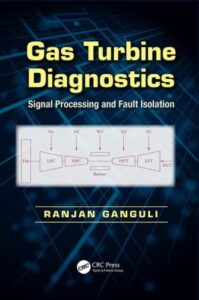Gas Turbine Diagnostics Signal Processing and Fault Isolation
Gas Turbine Diagnostics Signal Processing and Fault Isolation
Gas Turbine Diagnostics Signal Processing and Fault Isolation are very important components of modern infrastructure and are widely used in power generation. In particular, gas turbines are used for propulsion in jet engines that power most commercial and military aircraft. Faults in gas turbine engines can result in major problems, such as delays and cancellations of flights. Engine in-flight shutdowns (IFSDs) are particularly problematic and can have an impact on flight safety. Unscheduled engine removals add to the cost of air transport.
The book provides a discussion of the different methods in data filtering, trend shift detection, and fault isolation developed over the past decade. Each method is demonstrated through numerical simulations that can be easily done by the reader using worksheets such as MS Excel or through MATLAB®. The book provides a variety of new research tools for use in the condition monitoring of jet engines.
You can also read Risk Assessment Tools, Techniques, and Their Applications
Gas Turbine Diagnostics Signal Processing and Fault Isolation Content
- Preface
![Gas Turbine Diagnostics]()
- About the Author
- Introduction
- Idempotent Median Filters
- Median-Rational Hybrid Filters
- FIR-Median Hybrid Filters
- Transient Data and the Myriad Filter
- Trend Shift Detection
- Optimally Weighted Recursive Median Filters
- Kalman Filter
- Neural Network Architecture
- Fuzzy Logic System
- Soft Computing Approach
- Vibration-Based Diagnostics
- References
Though the measurements and models are specific to a turbofan engine, the algorithms given in this book will be useful to all engineers and scientists working on fault diagnosis of gas
turbine engines. The data cleaning algorithms based on nonlinear signal processing shown in this book are also applicable to condition and health monitoring problems in general, and as in all such problems, sharp changes in measurement data herald the onset of a fault.
Diagnostics of gas turbine engines is important because of the high cost of engine failure and the possible loss of human life. In this book, we will focus on aircraft or jet engines, which are a special class of gas turbine engines. Typically, physical faults in a gas turbine engine include problems such as erosion, corrosion, fouling, built-up dirt, foreign object damage (FOD), worn seals, burned or bowed blades, etc.


Comments are closed.